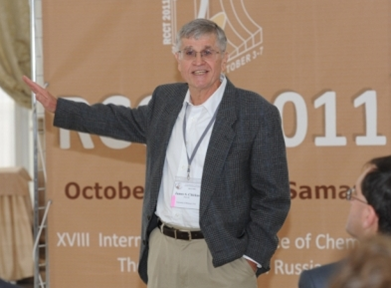-
About Us
Keith J. Stine, Chair
Mission Statement
Degree Offerings
Department Photos
Outreach Activities
-
Undergraduate Studies
Undergraduate Degrees
Undergraduate Program Advising
Undergraduate Scholarships and Awards
Research for Undergraduates
Resources
-
Graduate Studies
Graduate Program Overview
Graduate Degrees
Application to Graduate Program
Graduate Awards
Graduate Program Contact Information
-
Faculty
Faculty Contact Information
Inorganic
Organic
Analytical/Physical
Biochemistry
Chemistry Faculty Awards
-
Staff
-
Seminar Programs
Archive
Graduate Student Seminars
Robert W. Murray Lecture
Distinguished Alumni Lecture
-
Departmental News
News Archive
-
Facilities
High Field NMR Facility
MIST Lab
X-Ray Diffraction Facility
-
Alumni Interests
UMSL Chemists
Important Dates
Distinguished Alumni
Alumni Lecturers
-
Contact Information
|
|
Professor Chickos has been a member of the UMSL faculty since 1969. He received his undergraduate degree from the State University of New York-Buffalo, and his Ph.D. from Cornell University. He was an NIH Postdoctoral Fellow at Princeton University and the University of Wisconsin. He assumed Emeritus status in fall 2020. |
jsc@umsl.edu |
Research Interests
All scientific endeavors are dependent on the availability of reliable thermodynamic and physical property data. These data form the foundations on which our current understanding of the physical world is based. The measurement and collection of such data are a fundamental scientific task, common to all who practice the discipline.
We have had an interest in developing simple algorithms to model some of these physical properties. The purpose for doing so is to provide data in the absence of experiment and to provide a basis for the selection of a particular measurement in the presence of two or more discordant values. In addition, the process of distilling these physical data using these algorithms can sometimes produce parameters that can be used to evaluate molecular properties that cannot be measured directly.
Simple models have been developed to estimate condensed phase properties such as vaporization enthalpies, heat capacities, fusion entropies and enthalpies, vapor pressures and sublimation enthalpies of small molecules. Recently, the parameters generated by these algorithms have also been used in estimating fusion enthalpies of polymers and conformational entropy changes in globular proteins.
The development of models to mimic physical properties requires extensive databases and a constant updating of these databases. As a result, we have developed a collaborative interaction with the National Institutes of Standards and Technology in Washington DC in which physical property data flow freely in both directions. We currently supply NIST with sublimation enthalpies of organic compounds.
Coupled with our interest to develop models for such properties is the need to obtain experimental data. A variety of physical properties are measured in our research laboratories that include measurements of vaporization, sublimation and fusion enthalpies. We are also examining new simpler methods of making these measurements. One such process recently developed, correlation gas chromatography, affords the vaporization enthalpy of a solid or liquids at 298 K by simply using retention time measurements of knowns and unknowns.
Selected Publications
“Phase transition enthalpy measurements of organic compounds. An update of sublimation, vaporization and fusion enthalpies from 2016 to 2021,” W. Acree, Jr. and J. S. Chickos, J. Phys. Chem. Ref. Data 2023,51, 043101
″A correlation gas chromatographic study of the vaporization enthalpies and vapor pressures of patchoulol and 2-tetradecanol and estimations of their sublimation properties″, D. Simmons and J. S. Chickos, J. Chem. Thermodyn. 2022, 170, 106778.
"JPCRD: 50 Years of Providing the Scientific Community with Critically Evaluated Thermodynamic Data, Predictive Methods, and Large Thermodynamic Data Compilations," W. E. Acree and J. S. Chickos, J. Phys. & Chem. Ref. Data, 2021, 50, 033101.
"The Vaporization Enthalpy and Vapor Pressure of (±) N-Ethyl Amphetamine by Correlation Gas Chromatography," J. S. Chickos, Molecules, 2021, 26, 3809.
″Vaporization enthalpies and vapor pressures of the major components of opopanax oil, α-santalene, cisα-bisabolene, cis α-bergamotene″, D. Barton and J. S. Chickos, Structural Chemistry, 2021, 32, 939.
″The vapor pressure and vaporization enthalpy of (-) β-Elemene and (-) β-Bisabolene by correlation gas chromatography″, D. Barton and J. S. Chickos, J. Chem. Thermodyn. 2020, 148, 105139t.
